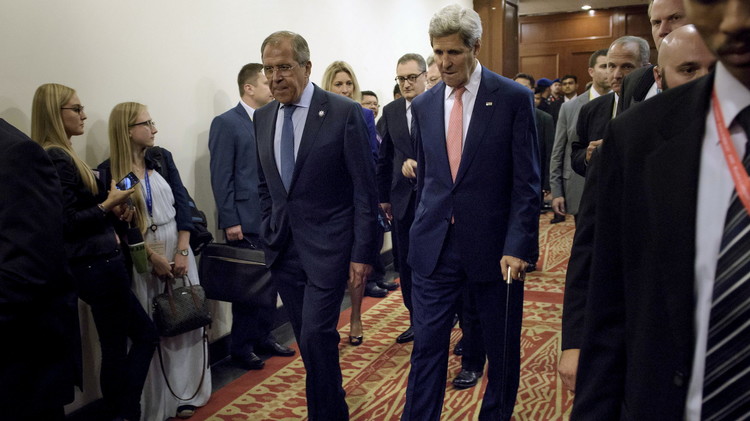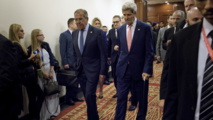But even as diplomats touted the agreement as a path to peace, a barrage of air strikes on two major cities in the north killed dozens.
The truce deal negotiated by US Secretary of State John Kerry and Russian Foreign Minister Sergei Lavrov is set to enter into force on Monday, the first day of the Muslim holiday of Eid al-Adha.
Syrian state news agency SANA reported that the "government has approved the agreement, and a cessation of hostilities will begin in Aleppo for humanitarian reasons".
Citing "informed sources", it said "the entire agreement was reached with the knowledge of the Syrian government".
The opposition High Negotiations Committee said it had yet to receive the deal's "official" text.
"We saw the agreement via the media -- we must receive an official copy," HNC spokesman Salem al-Meslet wrote on Twitter.
Leading HNC member Bassma Kodmani told AFP that her group "cautiously welcomed" the deal but was sceptical that Damascus would comply.
- 'Best chance' -
Both Kerry and Lavrov said the complex plan is the best chance to end the five-year war that has killed more than 290,000 people and seen millions flee to neighbouring countries.
Under the deal, fighting would halt across the country at sundown on Monday and Syria's air force would stop attacking rebel-held areas.
US special envoy to the Syrian crisis Michael Ratney appealed to rebel groups to commit to the deal, saying it was the "best way" to save lives.
In a letter, he said the initial truce would last 48 hours and could then be renewed, and that it would be "more effective than its predecessor" because it would halt Syrian strikes on "on civilians and the opposition".
To get aid into the battered second city of Aleppo, a "demilitarised zone" would be established around the Castello Road into the city.
In turn, Washington must get opposition groups it backs to separate themselves from the Fateh al-Sham Front, which changed its name from Al-Nusra Front after renouncing its ties to Al-Qaeda.
If a cessation of hostilities holds for one week, the US and Russia -- which back opposing sides -- could start joint operations against those jihadists.
The HNC's Kodmani said the opposition would "do our part" to see that rebel groups break ranks with the jihadists if the truce held.
UN Syria envoy Staffan de Mistura said that the deal provided a "window of opportunity" and that he would begin consultations on relaunching peace talks.
- 'Beginning of the end' -
But the deal faces some major obstacles.
The question of Assad's fate remains a key sticking point: the HNC repeated its demand this week that he leave power, but Russia continues to back him.
And Syria expert Charles Lister said mainstream opposition fighters had not indicated a willingness to break their alliance with powerful hardliners, which they see as "a military necessity".
The rebel-jihadist alliance is most pronounced in Idlib province, site of Saturday's deadly air strikes.
The Observatory said 58 people were killed in raids on various neighbourhoods of Idlib city, including a market, but it was not immediately clear who carried out the strikes.
The toll included 13 women and 13 children, it said.
An AFP photographer in Idlib saw men clambering over rubble in just sandals to help evacuate wounded and dust-covered residents from a collapsing building.
Another 12 civilians were killed in unidentified strikes on several neighbourhoods of Aleppo city, and 18 people died in bombardment of other parts of Aleppo province, the Observatory said.
A UN-backed truce in February faltered after each side accused the other of repeated violations.
Damascus resident Taher Ibrahim told AFP he did not expect this new truce to play out any differently.
"Nobody among the Syrian population accepts this agreement... (the opposition) are all the same and none of them will commit to this truce," he said.
But student Abdulhadi Al-Omari said he believed "it is the beginning of the end of the crisis".
"I am very optimistic because this truce is not like the previous one, it categorises the opposition groups between terrorist and moderate," he said.
British Foreign Minister Boris Johnson said it was "vital that the regime in Damascus now delivers on its obligations".
Key rebel backer Turkey said it was essential that the fighting stop and aid start flowing from day one of the ceasefire.
--------------------------------------------------------------------------------------------------------
The truce deal negotiated by US Secretary of State John Kerry and Russian Foreign Minister Sergei Lavrov is set to enter into force on Monday, the first day of the Muslim holiday of Eid al-Adha.
Syrian state news agency SANA reported that the "government has approved the agreement, and a cessation of hostilities will begin in Aleppo for humanitarian reasons".
Citing "informed sources", it said "the entire agreement was reached with the knowledge of the Syrian government".
The opposition High Negotiations Committee said it had yet to receive the deal's "official" text.
"We saw the agreement via the media -- we must receive an official copy," HNC spokesman Salem al-Meslet wrote on Twitter.
Leading HNC member Bassma Kodmani told AFP that her group "cautiously welcomed" the deal but was sceptical that Damascus would comply.
- 'Best chance' -
Both Kerry and Lavrov said the complex plan is the best chance to end the five-year war that has killed more than 290,000 people and seen millions flee to neighbouring countries.
Under the deal, fighting would halt across the country at sundown on Monday and Syria's air force would stop attacking rebel-held areas.
US special envoy to the Syrian crisis Michael Ratney appealed to rebel groups to commit to the deal, saying it was the "best way" to save lives.
In a letter, he said the initial truce would last 48 hours and could then be renewed, and that it would be "more effective than its predecessor" because it would halt Syrian strikes on "on civilians and the opposition".
To get aid into the battered second city of Aleppo, a "demilitarised zone" would be established around the Castello Road into the city.
In turn, Washington must get opposition groups it backs to separate themselves from the Fateh al-Sham Front, which changed its name from Al-Nusra Front after renouncing its ties to Al-Qaeda.
If a cessation of hostilities holds for one week, the US and Russia -- which back opposing sides -- could start joint operations against those jihadists.
The HNC's Kodmani said the opposition would "do our part" to see that rebel groups break ranks with the jihadists if the truce held.
UN Syria envoy Staffan de Mistura said that the deal provided a "window of opportunity" and that he would begin consultations on relaunching peace talks.
- 'Beginning of the end' -
But the deal faces some major obstacles.
The question of Assad's fate remains a key sticking point: the HNC repeated its demand this week that he leave power, but Russia continues to back him.
And Syria expert Charles Lister said mainstream opposition fighters had not indicated a willingness to break their alliance with powerful hardliners, which they see as "a military necessity".
The rebel-jihadist alliance is most pronounced in Idlib province, site of Saturday's deadly air strikes.
The Observatory said 58 people were killed in raids on various neighbourhoods of Idlib city, including a market, but it was not immediately clear who carried out the strikes.
The toll included 13 women and 13 children, it said.
An AFP photographer in Idlib saw men clambering over rubble in just sandals to help evacuate wounded and dust-covered residents from a collapsing building.
Another 12 civilians were killed in unidentified strikes on several neighbourhoods of Aleppo city, and 18 people died in bombardment of other parts of Aleppo province, the Observatory said.
A UN-backed truce in February faltered after each side accused the other of repeated violations.
Damascus resident Taher Ibrahim told AFP he did not expect this new truce to play out any differently.
"Nobody among the Syrian population accepts this agreement... (the opposition) are all the same and none of them will commit to this truce," he said.
But student Abdulhadi Al-Omari said he believed "it is the beginning of the end of the crisis".
"I am very optimistic because this truce is not like the previous one, it categorises the opposition groups between terrorist and moderate," he said.
British Foreign Minister Boris Johnson said it was "vital that the regime in Damascus now delivers on its obligations".
Key rebel backer Turkey said it was essential that the fighting stop and aid start flowing from day one of the ceasefire.
--------------------------------------------------------------------------------------------------------









 Home
Home Politics
Politics











